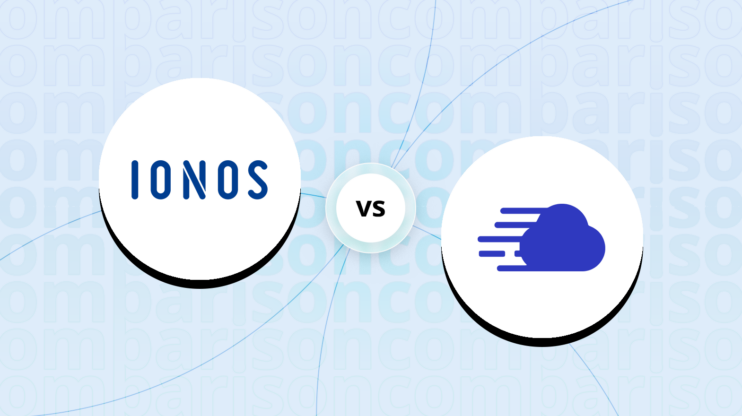WP Engine vs Cloudways: Final verdict
Looking over WP Engine vs. Cloudways, it’s clear why both hosts are so popular. They have both hosted millions of
websites that run on WordPress for decades, building up a loyal customer base.
-
WP Engine (Overall grade: 8.6)
is renowned for its managed WordPress hosting, providing a wealth of features specifically optimized for WordPress sites. It offers proprietary tools like EverCache® and extensive media optimization, ensuring optimal performance. The platform’s high uptime, impressive security measures, and 24/7 support make it a dependable choice for WordPress-focused businesses and developers. However, the higher price point and lack of certain features like email hosting might be a drawback for some users.
-
Cloudways (Overall grade: 8.5)
excels in flexibility and performance, catering to a variety of applications beyond just WordPress. Its strengths lie in vertical scaling, the ability to choose from multiple top-tier cloud providers, and performance-enhancing features like built-in caches. The user-friendly control panel and extensive support options, including premium add-ons, make Cloudways a robust option for businesses needing scalable and high-performing hosting solutions. However, the absence of native email hosting and domain registration might require additional solutions, which could be a minor inconvenience.
 Overall grade:8.6 |
 Overall grade:8.5 |
|
|---|---|---|
| Uptime and Availability | 9.6 | 9.5 |
| Hosting Performance | 9.1 | 8.8 |
| Hosting Security | 9.4 | 8.0 |
| Price | 8.1 | 8.6 |
| Hosting Features | 6.8 | 6.9 |
| Ease Of Setup | 8.3 | 9.0 |
| User Management | 8.8 | 8.2 |
| Customer Support | 8.9 | 9.2 |
| User feedback | 4.6/5 | 4.7/5 |
Hosting types offered
Both platforms provide a variety of hosting types, each designed to meet the different needs of users.
 |
 |
|
|---|---|---|
| Shared hosting | ||
| Cloud hosting | ||
| WordPress hosting | ||
| Ecommerce hosting | ||
| VPS hosting | ||
| Dedicated hosting |
Although both offer a variety of hosting plans tailored to different needs, in
certain cases, one platform may prove to be more suitable.
Detailed comparison
Uptime and availability
Evaluates the average uptime statistics, uptime guarantee and overall availability of the hosting
provider
Score Components:
- Uptime percentage (30%): evaluates the uptime statistics in given period of time
- Uptime guarantee (20%): Assesses if the platform offers an uptime guarantee and
whether the actual uptime matches the promised guarantee. - General performance (25%): Evaluates how fast is the average response time and overall
it’s stability. - Responsiveness (10%): Adaptability to different devices and screen sizes.
- Availability (25%): Reflects the total downtime and number of outages.
 9.6
9.6
 9.5
9.5
Winner WP Engine: Outstanding uptime and global support for WordPress sites.
WP Engine excels in maintaining high uptime and site availability. With 24/7 monitoring, the platform ensures prompt alerts for any outages. Its 99.99% SLA guarantees reliability, making it ideal for handling significant traffic without downtime. Global data centers reduce latency, enhancing site performance across regions.
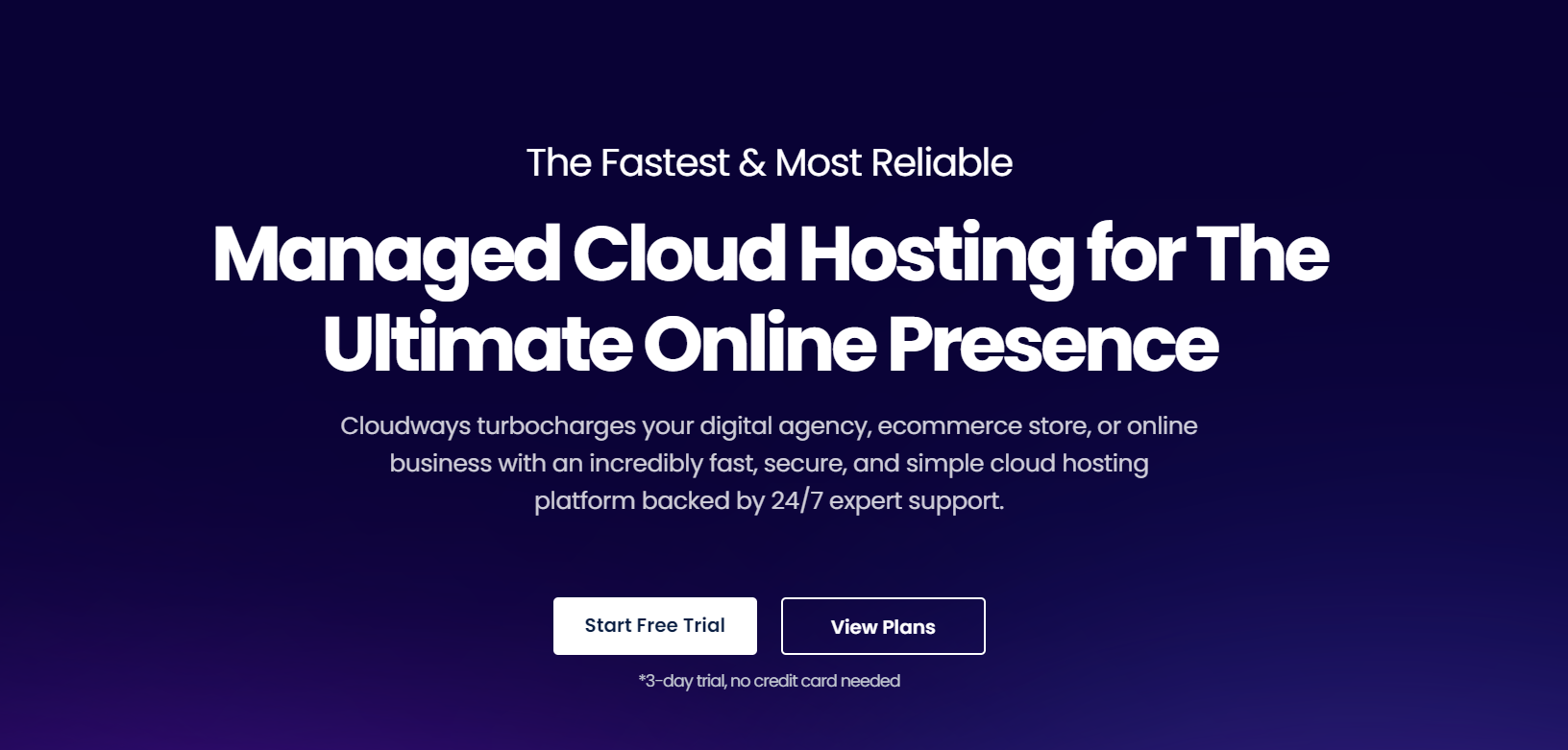
Cloudways boasts impressive uptime and strong performance metrics. The platform supports multiple cloud providers and offers vertical scaling, ensuring flexibility and scalability. However, Cloudways doesn’t provide domain registration or email hosting, which might require additional solutions. While it offers a 99.99% uptime guarantee, its overall feature set places it slightly behind WP Engine.

Which one has better hosting performance?
Score Components:
- Hosting speed (30%): This includes SSD quality, Load times, PageSpeed score ranges,
additional information on website speed, built-in plugins for performance enhancement, available caching
methods, and CPU/RAM options - CDN (20%): Considers whether CDN is available or not, whether it’s free or paid, and
the quality of the CDN service - Available data centers (30%): Evaluates the number of data centers and their locations
globally. - Scalibility (20%): Looks at whether elastic scaling is available, the process required
to scale (manual upgrade vs. automatic scaling), the presence of dedicated servers, and the costs
associated with scaling.
 9.1
9.1
 8.8
8.8
🏆 Winner: WP Engine: Exceptional managed WordPress hosting with remarkable speed and security.
WP Engine and Cloudways both offer impressive performance, but nuances set them apart. WP Engine boasts fast page load times due to EverCache® technology and a global CDN with 200+ points of presence. Cloudways also offers speed with SSD drives and built-in caches like Memcached and Redis. While WP Engine focuses on a global CDN to ensure peak performance, Cloudways uses Cloudflare Enterprise for enhanced security and speed. WP Engine has data centers worldwide, including the US, Europe, and Asia-Pacific, while Cloudways allows easy expansion with leading cloud providers, though specific locations aren’t detailed.
Website Speed
WP Engine shines in website speed, thanks to its EverCache® technology and free global CDN, combined with the latest PHP versions. This ensures that pages load quickly, crucial for both user experience and SEO. Cloudways leverages SSD drives and advanced caches like NGINX, Memcached, and Redis for fast load times. It also provides PHP 8.2 ready servers and Breeze, a preinstalled WordPress cache plugin. Both hosts deliver impressive speed, but WP Engine’s proprietary technologies and end-to-end optimization give it an edge.
Scalability
WP Engine offers scalable architecture with isolated resources to manage traffic spikes effectively. Users may need to upgrade plans manually based on their needs. Cloudways, on the other hand, provides vertical scaling, allowing resources like RAM and CPU to scale seamlessly, with options to adjust on-demand. Though specific costs aren’t clearly outlined, Cloudways tends to offer more flexibility with its 1-click scaling features and integration with leading cloud providers.
Which one has better security features?
and regulatory requirements
Score Components:
- Technical security measures (40%): This includes encryption, firewalls, DDoS
protection, secure configurations, server monitoring, access control and availability of security addons
(e.g Sitelock security). - Operational security measures (30%): Encompasses data privacy, backups and data
redundancy. - Compliance and certifications (20%): Adherence to legal and regulatory requirements
(e.g., GDPR, HIPAA) and possession of certifications (e.g., ISO 27001, SOC 2). - Business and reliability (10%): Factors in the provider’s reputation, uptime
guarantees, and customer support.
 9.4
9.4
 8.0
8.0
🏆 Winner
WP Engine: Offering robust security features including continuous threat monitoring and multiple compliance certifications, WP Engine stands out.
Technical security measures:
WP Engine employs enterprise-grade technology, blocking 72 million attacks daily and providing automated updates. It also boasts advanced protections such as Global Edge Security, managed Web Application Firewall (WAF), DDoS mitigation, and SSL. Cloudways offers free 1-Click SSL and dedicated firewalls, alongside tools like Fail2ban and bot protection powered by MalCare. Additionally, Cloudways supports PHP versions up to PHP 8.2, including regular security patches and updates. WP Engine, on the other hand, focuses significantly on proactive threat detection and real-time security management.
Operational security measures:
WP Engine provides 24/7 support with a live team monitoring security feeds, and daily backups. It includes features like data encryption, two-factor authentication, and automated plugin updates. Cloudways enhances operational security with two-factor authentication, auto-healing servers, and IP whitelisting for secure server access. Both providers offer DDoS mitigation, but WP Engine’s Global Edge Security offers an advanced solution that includes Argo Smart Routing for optimal web traffic paths.
Compliance and certifications:
WP Engine is SOC-2 compliant and ISO 27001-2013 certified, meeting high standards for security and information management. Cloudways doesn’t specify its GDPR compliance explicitly but focuses on security and data protection. For PCI compliance, WP Engine sites may be scanned for vulnerabilities, though results can vary. Cloudways relies on its cloud infrastructure providers for PCI-DSS level 1 compliant hardware, indicating indirect compliance dependent on customer implementation.
 |
 |
|
|---|---|---|
SSL certificate |
Free |
Free 1-Click SSL |
Additional security features |
Automated threat detection, daily backups, two-factor authentication |
Bot protection, auto-healing servers, IP whitelisting |
PHP versions |
Not specified |
Supports up to PHP 8.2 |
GDPR compliance |
Not specified |
Likely align with requirements |
HIPAA compliance |
Not specified |
Not specified |
PCI compliance |
Vulnerability scanning |
Dependent on cloud providers |
Hosting features
Score Components:
- Domains (20%): Assesses the availability of a free domain, domain purchase options, and
pricing - Email (15%): Considers if the provider offers full email hosting, or is reselling
third-party service, and if the email is only transactional or not - Website builder (15%): Checks if website builder is available, and it’s user
friendliness and overall the level of customization allowed. - Staging environment (20%): Determines if a staging environment is available, allowing
for testing changes before going live. - FTP & SFTP accounts (10%): Evaluates if and how easily users can access FTP and
SFTP accounts - Git and SSH access (20%): Assess whether Git is integrated into the hosting service and
if SSH access is provided
 6.8
6.8
 6.9
6.9
!!!html
🏆 Winner
Cloudways: A solid choice with high performance and flexibility.
WP Engine and Cloudways both offer robust hosting solutions, but they cater to different needs. WP Engine is highly specialized in managed WordPress hosting with plans that include essential features for basic sites all the way to enterprise-level performance. Its fully managed services, daily backups, and comprehensive security features make it a go-to option for businesses primarily focused on WordPress. The free automated migration plugin and 24/7 support bolster its user-friendly approach. Unique offerings like EverCache® technology and Edge Content Delivery ensure optimized speed and reliability.
Cloudways, on the other hand, is well-known for its flexibility and performance. Its focus goes beyond just WordPress to WooCommerce and other applications, providing built-in caches like Memcached, Varnish, and Redis to enhance speed. Cloudways also offers vertical scaling, so users can easily adjust resources like RAM and CPU based on their needs without any long-term contracts. They emphasize ease of use with features like 1-Click actions for backups and server cloning, along with SSH/SFTP access for secure server management. The absence of a free domain and email hosting could be a downside, considering these are often desired by small business owners.
 |
 |
|
|---|---|---|
Free domain |
No |
No |
Free SSL |
Yes |
Yes |
Email hosting |
No |
Rackspace Email Add-on |
Website builder |
No |
No |
Staging environment |
Yes |
Yes |
FTP & SFTP accounts |
Yes |
Yes |
Git and SSH access |
Yes |
Yes |
Free backup |
Yes |
Yes |
Money back guarantee |
No |
Yes |
a location.
As a result in rare cases the features mentioned here can differ from the ones you see on their websites.
Both providers support a range of users from beginners to experts with user-friendly website builders and WordPress staging areas. However, in terms of developer tools, both WP Engine and Cloudways offer robust options including SSH access, support for multiple programming languages, and Git for version control, thus appealing to developers looking for advanced capabilities.
Email services:
WP Engine does not include email hosting, making it less convenient for users who want an all-in-one solution. Cloudways offers a Rackspace Email Add-on and Elastic Email for transactional email services, but it doesn’t include native email hosting in its plans. This means users may need to rely on third-party services like Google Workspace or Zoho for their email needs, which is a simpler setup compared to WP Engine’s complete absence of email features.
Price
Score Components:
- Plan value (40%): What each pricing tier offers.
- Transparency and clarity (30%): Clearness of pricing structures.
- Flexibility of plans (20%): Range of options to suit different budgets.
- Hidden costs (10%): Additional expenses not included in the plan.
 8.1
8.1
 8.6
8.6
🏆 Winner
Cloudways: Cloudways offers a diverse range of hosting solutions, catering to various needs and budgets.
Evaluating the pricing of plans among various hosting providers can be complex due to their differing pricing and renewal strategies. Additionally, certain plans require annual commitments, which adds to the difficulty of making comparisons. The prices listed are based on monthly commitments; plans requiring annual commitments are indicated. Although some providers offer identical plans for WordPress and shared hosting, we have created separate tables for each to enhance clarity.
Cloudways provides a wider range of hosting plans with varying levels of RAM, processor cores, and storage capacities, catering to both WordPress and eCommerce hosting needs. Their starting price tends to be lower across the board. In contrast, WP Engine focuses exclusively on managed WordPress hosting, offering extensive security features, automated updates, premium themes, and a robust global CDN. WP Engine’s premium comes with higher price points but includes advanced features such as EverCache® and Genesis blocks for site creation.
 |
 |
|---|---|
|
Startup $20
1 site, 10 GB storage, 50 GB bandwidth, chat support, SSL, backups, 99.99% SLA, CDN. Value for price:8.1
|
DO1GB $11
1 GB RAM, 1 Core, 25 GB storage, 1 TB bandwidth, chat support. Value for price:8.4
|
|
Professional $40
3 sites, 15 GB storage, 125 GB bandwidth, chat & phone support, SSL, backups, 99.99% SLA, CDN. Value for price:8.3
|
DO2GB $24
2 GB RAM, 1 Core, 50 GB storage, 2 TB bandwidth, chat support. Value for price:8.5
|
|
Growth $77
10 sites, 20 GB storage, 200 GB bandwidth, priority support, SSL, backups, 99.99% SLA, CDN. Value for price:8.2
|
DO4GB $46
4 GB RAM, 2 Core, 80 GB storage, 4 TB bandwidth, chat support. Value for price:8.7
|
|
Scale $194
30 sites, 50 GB storage, 500 GB bandwidth, priority support, SSL, backups, 99.99% SLA, CDN. Value for price:8.1
|
DO8GB $88
8 GB RAM, 4 Core, 160 GB storage, 5 TB bandwidth, chat support. Value for price:8.8
|
|
Custom $600
Contact sales for features. Value for price:8.0
|
DO16GB $149
16 GB RAM, 8 Core, 320 GB storage, 6 TB bandwidth, chat support. Value for price:8.6
|
 |
 |
|---|---|
|
Startup $20
1 site, 10 GB storage, 50 GB bandwidth, chat support, SSL, backups, 99.99% SLA, CDN. Value for price:8.1
|
Vultr1GB $14
1 GB RAM, 1 Core, 25 GB storage, 1 TB bandwidth, 24/7 support. Value for price:8.3
|
|
N/A
|
Lin1GB $14
1 GB RAM, 1 Core, 25 GB storage, 1 TB bandwidth, 24/7 support. Value for price:8.3
|
 |
 |
|---|---|
|
Custom $600
Contact sales for details. Value for price:8.0
|
Vultr2GB $28
2 GB RAM, 1 Core, 55 GB storage, 2 TB bandwidth, 24/7 support. Value for price:8.4
|
|
N/A
|
Lin2GB $28
2 GB RAM, 1 Core, 50 GB storage, 2 TB bandwidth, 24/7 support. Value for price:8.4
|
Enterprise plans
WP Engine and Cloudways cater to enterprises with their Custom and high-tier plans. WP Engine provides a detailed suite of advanced features with comprehensive priority support, making it ideal for businesses requiring extensive security and dedicated account management. Cloudways offers a broad selection of scalable cloud environments across multiple infrastructures, allowing enterprises to tailor resources more flexibly.
WP Engine vs Cloudways: Ease of setup
platform.
Score Components:
- Site migration (25%): Assesses whether the provider offers tools for site migration,
either automated or manual, and whether these services are free or require a fee. - Admin panel usability (35%): Evaluates the type of admin panel provided, such as the
standard cPanel or a custom solution, focusing on its accessibility and user-friendliness for both
technical and non-technical users. - Setup features (20%): Examines the availability and ease of use of various setup
features, including FTP accounts, file managers, email account setup, PHPMyAdmin, and easy CDN
configuration. - Help center quality (20%): Measures the quality and accessibility of the provider’s
help center resources, including articles and tutorials.
 8.3
8.3
 9.0
9.0
🏆 Winner
Cloudways: A hosting provider with an intuitive and highly functional control panel that simplifies server management.
WP Engine offers a custom control panel designed specifically for WordPress sites. Its layout is clean and easy to navigate, making it suitable for both technical and non-technical users. The panel includes integrated tools for backups and migrations, though the platform’s specialized focus can limit flexibility for users needing broader capabilities.
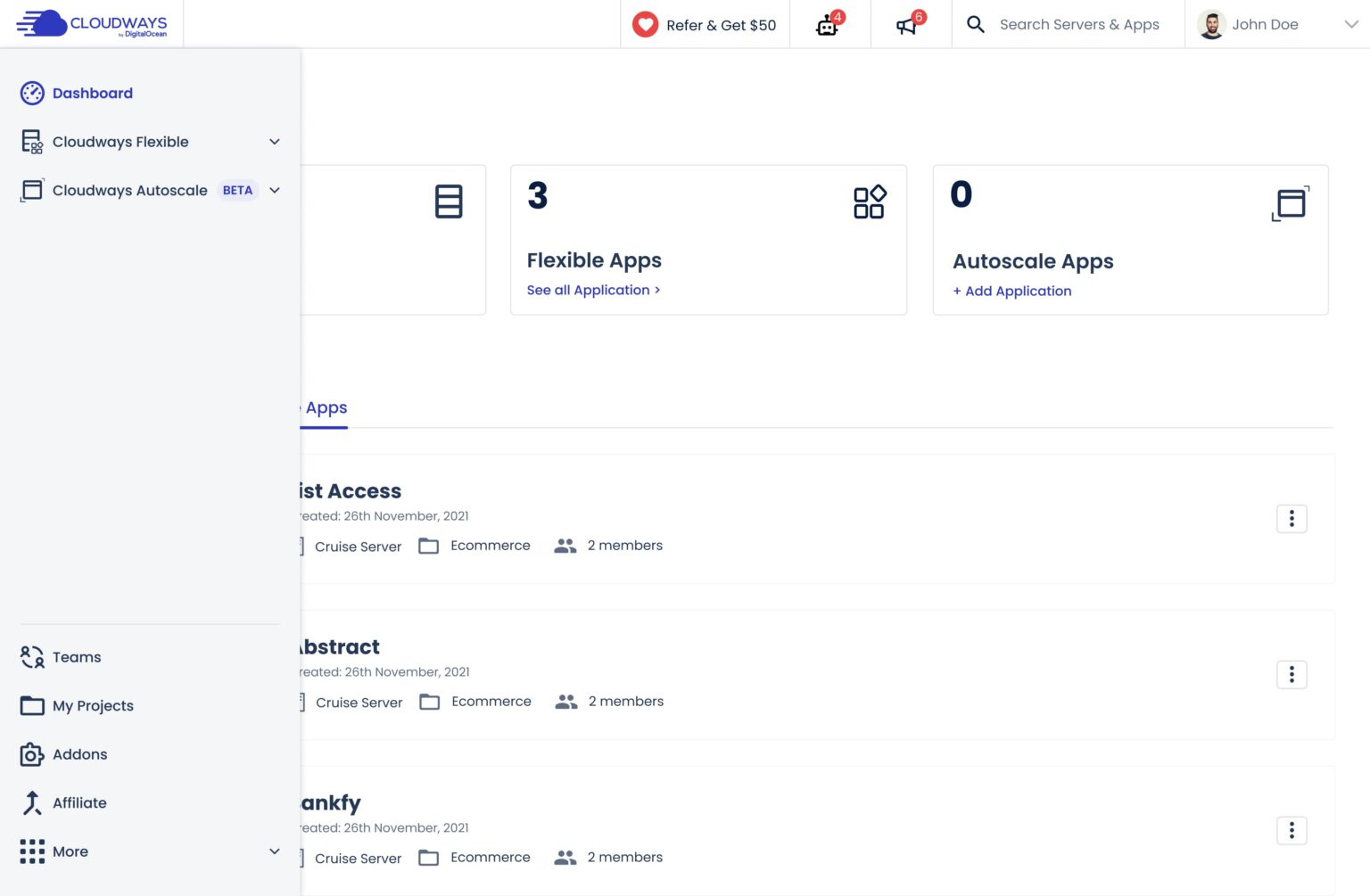
In contrast, Cloudways provides an intuitive control panel that caters to a broad range of applications, including WordPress, Magento, and Laravel. It offers 1-click actions for various tasks, enhancing usability for users of any skill level. The inclusion of vertical scaling options directly within the control panel further helps streamline resource management, making the hosting experience efficient and straightforward.
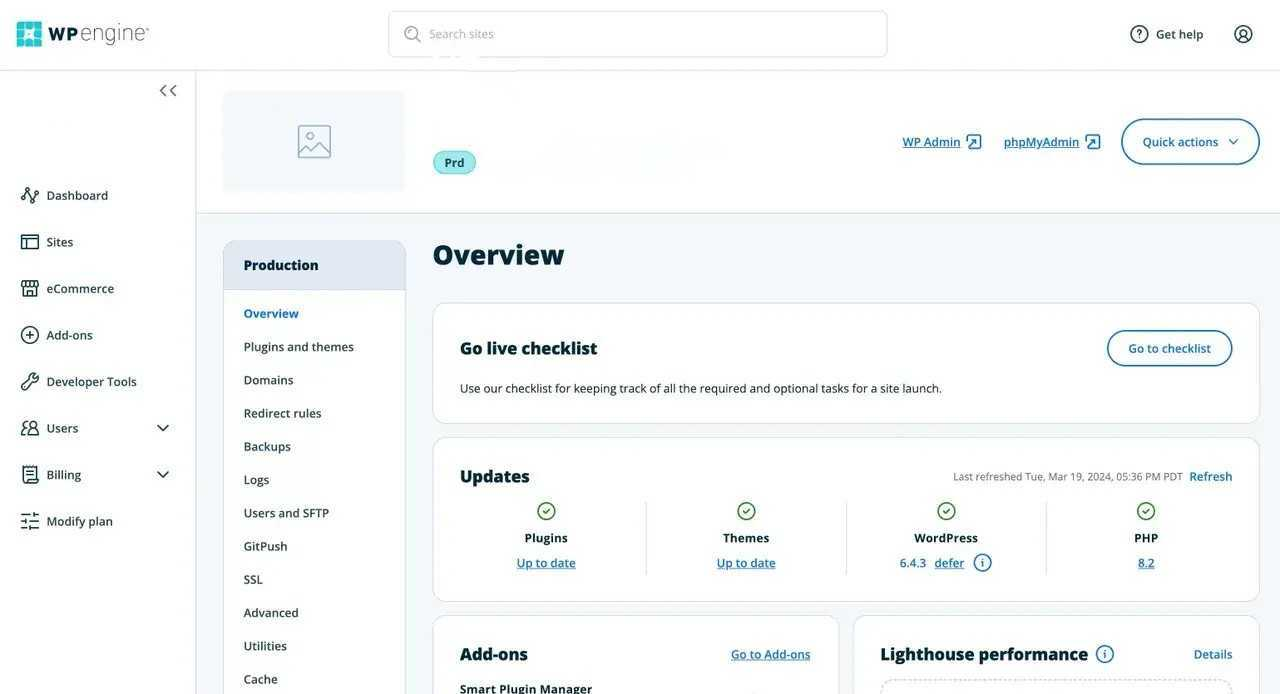
WP Engine facilitates site migration through a free Automated Migration plugin or a Manual Migration Checklist for more complex scenarios. These options make it easier for users to transfer their WordPress sites, with 24/7 support available to help. Cloudways also offers free migration services for the first website from any host and includes automated solutions like server cloning and staging URLs. Both providers offer strong migration tools, but Cloudways edges out with its 1-click cloning and staging capabilities.
WP Engine’s Support Center is comprehensive, featuring articles on diverse topics such as site setup, troubleshooting, and optimizing performance. The resources cater to both novice and expert users, backed by 24/7 phone and chat support. Cloudways has a similarly extensive Help Center, offering articles, guides, troubleshooting tools, and a ticketing system. The active community forum and premium support add-ons complement their extensive resources.
User management
accessibility.
Score Components:
- Role customization (40%): Flexibility in creating and defining user roles and
permissions. - Ease of management (30%): User interface and tools for managing users.
- Access control (20%): Effectiveness of access control measures for different user
levels. - Scalability (10%): Ability to manage a growing number of users efficiently.
 8.8
8.8
 8.2
8.2
🏆 Winner: WP Engine: A comprehensive solution for advanced user management and control.
Both WP Engine and Cloudways offer diverse user management features, but their approaches vary in flexibility and scope. WP Engine provides an extensive set of user roles and capabilities, allowing for granular control over who can perform specific actions on the platform. It has distinct roles like Owner, Full, and Partial, each with specific permissions tailored to different needs, making it easy to delegate and manage responsibilities. On the other hand, Cloudways relies on the native WordPress Admin Panel for user management, which includes standard WordPress roles such as Administrator, Editor, and Subscriber. While this is straightforward and integrates well with WordPress, it lacks the detailed role customization available on WP Engine.
When it comes to user interfaces and tools for managing users, WP Engine offers a dedicated User Portal that streamlines the management of users and their roles. The steps for adding, editing, and removing users are clearly defined and straightforward, ensuring ease of use. WP Engine also provides a feature-rich environment for managing SFTP logins and technical contacts directly from the User Portal. Cloudways uses the WordPress Admin Panel for similar functions, which is familiar to WordPress users but may feel limited compared to WP Engine’s comprehensive User Portal. The Cloudways interface focuses more on application-level management rather than providing specialized tools for user role administration.
In evaluating the effectiveness of access control measures and handling a growing number of users, WP Engine stands out with its robust set of defined actions and audit logs. The ability to filter logs by user, environment, and action adds another layer of security and accountability, essential for growing businesses. WP Engine’s various user roles allow for precise access control, ensuring that users only have the permissions they need. Cloudways, while effective for smaller teams, may struggle to offer the same level of detailed access control and monitoring as team sizes increase and more complex permissions are required.
WP Engine user roles table:
| Role | Description | Access highlights |
|---|---|---|
| Owner | Complete access to everything, including deleting sites and closing accounts. | Can add, edit, and delete users; manage all environments; handle billing; access all features and settings. |
| Full (with Billing) | Full access excluding user management and account closures. | Can manage billing, transfer sites, and modify Smart Plugin Manager; cannot delete environments or add users. |
| Full (no Billing) | Full access without billing capabilities. | Can manage site settings and Smart Plugin Manager; cannot initiate billing actions or handle user management. |
| Partial (with Billing) | Limited to specified environments with billing access. | Can manage billing and environment-specific settings; cannot manage users or create new environments. |
| Partial (no Billing) | Limited to specified environments without billing access. | Can copy and restore between environments; cannot perform billing actions or manage users. |
Customer support
hosting provider.
Score Components:
- Support communication channels (30%): Measures the variety of customer support types
provided (live chat, chatbot, email, phone, etc.) - Availability (20%): Assesses the availability hours for each channel, including 24/7
support options. - Technical support quality (30%): Assesses whether the provider offers comprehensive
technical support, including hardware upgrades (e.g., HDD to SSD), software installations, and web
server configuration changes. - Enterprise support (20%): Checks if there are dedicated or priority support services
for enterprise-level customers.
 8.9
8.9
 9.2
9.2
🏆 Winner Cloudways: Offers extensive support options, including proactive monitoring and different premium support tiers with varying response times.
 |
 |
|
|---|---|---|
Phone support |
||
Live chat support |
||
Chatbot |
||
Email/ticket support |
||
Enterprise support (dedicated agents, priority support) |

WP Engine and Cloudways both excel with their 24/7 customer support. WP Engine provides phone and live chat support as standard, along with a user portal and extensive knowledge base. Its customer satisfaction is high, benefiting from the expertise of WordPress specialists. Premium plans allow access to more experienced support staff and other advanced support features.
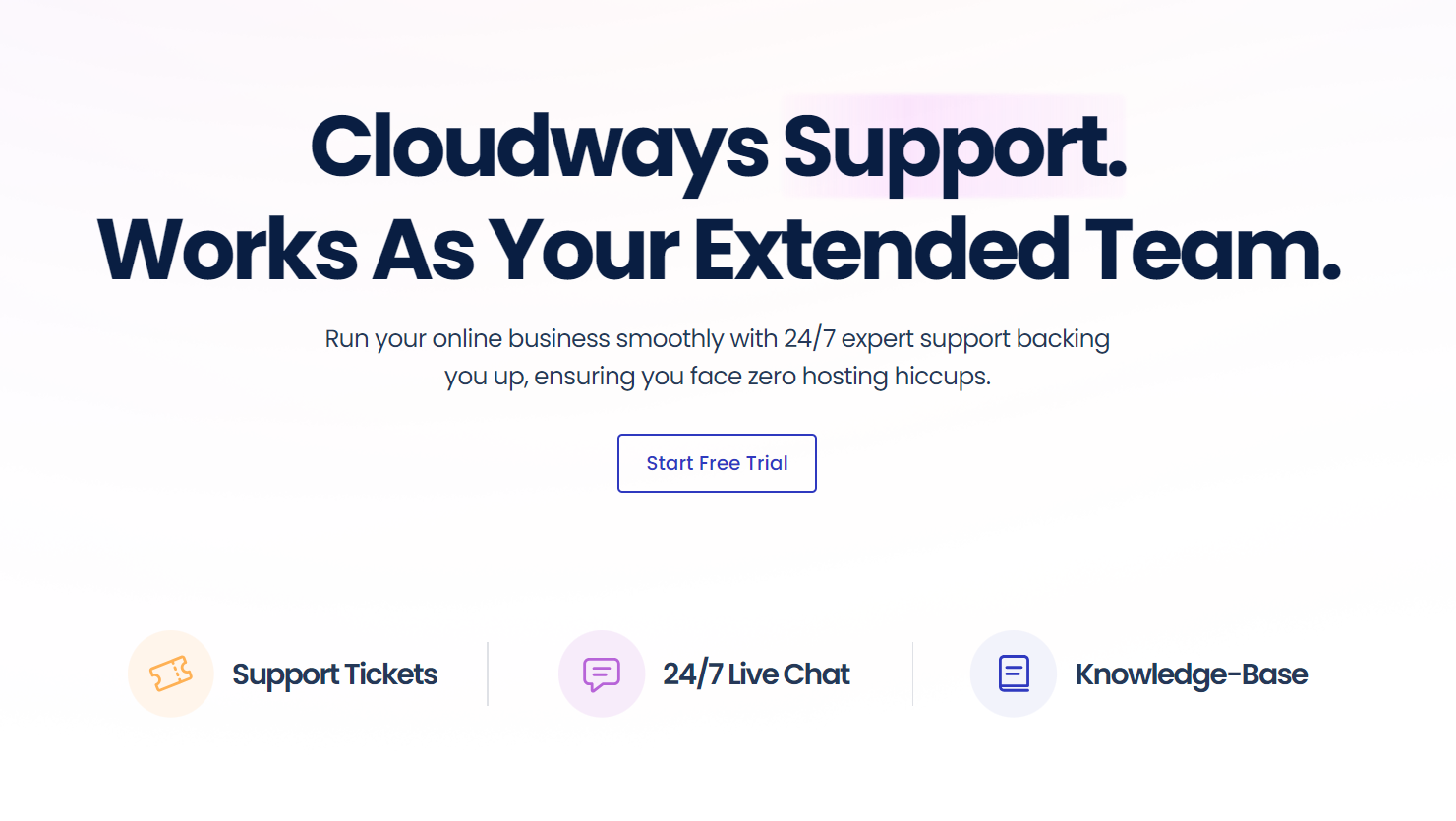
Cloudways matches WP Engine’s 24/7 support but extends its channels to include email/ticket systems, live chat, and support over Skype or phone by request. Cloudways also offers three tiers of support add-ons, tailoring response times based on chosen plans. The premium support add-ons provide phone support, a dedicated account manager, and a private Slack channel. With proactive monitoring and customization support, Cloudways offers extensive support capabilities.
WP Engine vs Cloudways: User feedback
WP Engine exudes excellence in managed WordPress hosting, boasting top-notch technical support that’s often highlighted as a standout feature. Users appreciate the user-friendly dashboard, seamless migration tools, daily backups, and solid security measures, all of which contribute to high performance and reliability. However, the service does come at a higher price point, which some users find steep, especially for entry-level plans or smaller projects. Despite occasional concerns about costs and some technical nuances, WP Engine’s premium service quality justifies the expense for many, making it a highly recommended solution for businesses and developers alike.
Cloudways consistently receives high praise for its ease of use, robust performance, and excellent customer support. Many reviewers highlight the platform’s intuitive interface, effective server management features, and the ability to choose from top-tier cloud providers like AWS and DigitalOcean. Users appreciate the scalable hosting options and reliable customer service, which often includes quick response times and helpful assistance. However, some customers note areas for improvement, such as the absence of email hosting, limitations on server vendor choices, and discrepancies in pricing transparency. Overall, Cloudways is deemed a solid hosting provider, especially valued for its managed hosting features and performance enhancement capabilities.
WP Engine vs Cloudways: FAQ
Which platform is better suited for hosting WordPress websites?
WP Engine is better suited for hosting WordPress websites, as it specializes in managed WordPress hosting and offers features specifically optimized for WordPress sites. Its proprietary tools like EverCache® and extensive media optimization ensure optimal performance for WordPress. Cloudways also supports WordPress hosting, but its flexibility caters to a broader range of applications beyond just WordPress.
Which hosting service offers better security features?
WP Engine offers more comprehensive security features, including enterprise-grade technology, automated updates, advanced protections like Global Edge Security, managed Web Application Firewall (WAF), and DDoS mitigation. Cloudways provides essential security measures such as free 1-click SSL, dedicated firewalls, and bot protection, but WP Engine’s proactive threat detection and real-time security management give it an edge.
Which hosting service offers more scalability options for growing websites?
Cloudways offers more scalability options for growing websites, with vertical scaling allowing resources like RAM and CPU to scale seamlessly on demand. This flexibility enables users to adjust resources without upgrading plans manually. WP Engine offers scalable architecture with isolated resources to manage traffic spikes, but users may need to manually upgrade plans as their needs grow.
Which platform offers better customer support?
Both WP Engine and Cloudways provide robust 24/7 customer support, but Cloudways offers more extensive support options, including email/ticket systems, live chat, and support over Skype or phone by request. Cloudways also has three tiers of support add-ons, providing tailored response times and features like a dedicated account manager and private Slack channel. WP Engine’s support is noted for being specialized in WordPress, though it is generally seen as less flexible compared to Cloudways.
What are the major differences in pricing and value between wpengine and cloudways?
WP Engine focuses on managed WordPress hosting with higher price points but includes advanced features like EverCache® and a robust global CDN. Its plans start at $20 per month for basic services. Cloudways offers a wider range of hosting plans with lower starting prices, catering to both WordPress and other applications. The flexibility and performance enhancements like built-in caches make Cloudways a more cost-effective option for many users.
How do the providers handle email hosting and what features are included?
WP Engine does not include email hosting, requiring users to rely on third-party services like Google Workspace for their email needs. Cloudways offers Rackspace Email add-ons for email services and Elastic Email for transactional email but also lacks native email hosting. Overall, Cloudways provides easier integration with third-party email services compared to WP Engine’s complete absence of email features.
The making of this blog
We followed a clear, step-by-step process to write and research this article.









